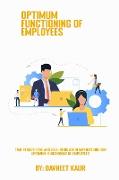- Start
- Time perspective and self-regulation implications for optimum functioning of employees
Time perspective and self-regulation implications for optimum functioning of employees
Angebote / Angebote:
INTRODUCTION Over the past two decades, the professional world is reinventing its organizational principles because traditional organizational methods are not functioning well. The strengths and weaknesses of an organization are determined by the quality of its human resources, which play a vital role in using other organizational resources and the development process of modern economies. Therefore, companies are increasingly thinking about new ways to attain optimal functioning of employees by flourishing and realizing their potential. Optimal functioning focuses on understanding how individuals become the best that they can be, as well as how they may achieve their personal potentials. This optimal functioning conveys the idea of a system, an organism, or an individual that is working optimally, not only in terms of the results it produces, but also in terms of developmentally consequential qualities such as coherence, balance, generativity, and mental state in which a person performs an activity. Individuals' cognitive, behavioural and emotional components that enable them to fully express their potentials have come to the forefront over the last years with a focus on individuals' personal strengths and potential to improve functioning. The current research presents a combination of time perspective and self-regulation to facilitate optimal functioning in organizations, which aims to bring work-life balance and commitment in the functioning of employees on all levels. The issues of work-family and work-life balance have received extensive publicity and have been subject to increasing investigations (Hogarth et al., 2000, Clark, 2000, Fisher, 2001, Greenhaus et al., 2003, Eby et al., 2005, Mathew & Panchanatham, 2009, 2010). India is emerging as vast economy in front of the world, due to which individuals' needs and work conditions have drastically changed within the last decade, which altered the perception of a satisfactory work-life balance. Managing the interface between work and home has emerged as a central topic for management, practitioners and academics. Everyone wants it, but no one has it because work and family life are not always compatible, and conflicts between the two domains are often experienced. Changes in the work style, work culture, family needs, are rapidly taking place which eventually increased the population of dual earner couples, single parent families and elder care responsibilities. These increased changes can have adverse impact on employees' as well as organizational performance (Kossek, 2005, Bragger et al., 2005, Anderson et al., 2002). The tension between an individual's desire for,
Fremdlagertitel. Lieferzeit unbestimmt

